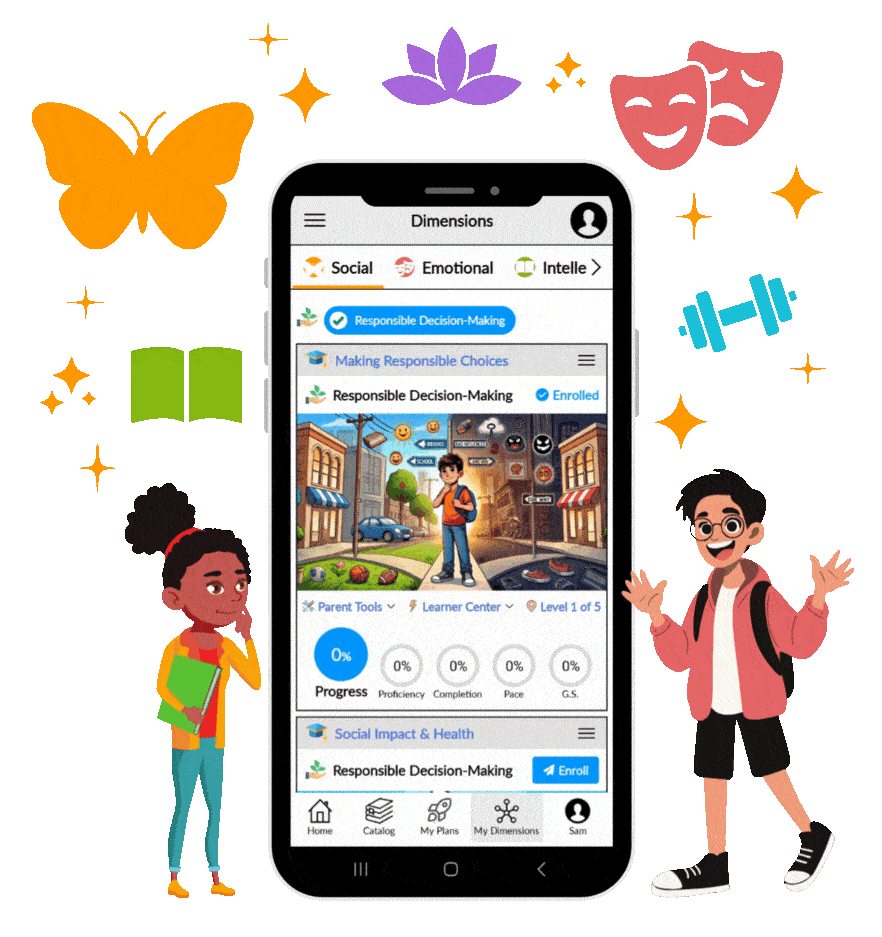Self-Confidence For Kids & Parents
Strategies to improve self-confidence, self-worth, and self-image and why they matter.
Does Your Child Dream Big, But Doubt Holds Them Back?
We aren't born knowing how to be self-confident and most schools do not include or prioritize social-emotional skills.
Holistic life skills like self-confidence are skills that need to be taught just like math or reading!
Imagine if we treated academics the same way we treat soft skills...
Reading? You'll pick it up as you go. Math? Don't worry, you'll figure it out as you get older.
Sounds silly, right?
This is exactly why Bloomster is here to make things better for parents.
What Is Bloomster?
Bloomster is the first online education platform designed to teach holistic life skills to tweens and teens. We have courses teaching over 30 skills through engaging video lessons on an easy to use mobile app or desktop platform.
Bloomster courses are created by top experts in the fields of child psychology, education, and adolescent development to create an affordable way for parents like you to access the best of the best.
A whole year of Bloomster costs less than a 1 hour session with a child psychologist!
Join the community of parents who trust Bloomster to help them during the most challenging years of raising a child.

What Makes The Confident You Course Better Than Just Teaching My Child On My Own?
Confident You: Believe In Yourself, and every other Bloomster course, is designed by top experts in child psychology, education, and adolescent development.
These experts bring together scientifically proven techniques and combine them with relatable storytelling to create engaging video lessons. Bloomster utilizes peer-to-peer learning models, which is proven to be more effective for kids ages 10 to 15.
Video lessons turn screen time into learning time, taking stress off of you so you can get things done without feeling guilty!
Oh, and you get a premium Bloomster account FREE for 30 days (no credit card required!), which is plenty of time for your tween or teen to take the full course!
You Might Be Asking 'How Will I Know It's Working?'...
Dr. Medlock explains how Bloomster implements scenario based knowledge checks, pre and post growth surveys, and more so you can feel confident knowing they are learning these critical social-emotional skills.
About The Course
Confident You: Believe In Yourself
In this course, the learner will learn about self-confidence and self-esteem and how they play a role in how kids feel about both themselves and others. They will learn about tools they can use to build self-confidence, like using positive self-talk, and get comfortable asking others for help and for what they want.
|
Meet Course Creator, Dr. Lisabeth Medlock
Dr. Medlock is a psychologist, ICF and Board Certified Coach and consultant with a mission to help people and organizations do better and be better. She serves as an advocate, solutions finder, change agent and resource. For 30 years she has worked with public and nonprofit organizations, beginning in middle schools developing self-competence and conflict resolution programs. She has worked with over 100 organizations to improve their impact on the people and communities they serve. She has been a blogger for the Huffington Post, a TEDx speaker, an author, and has developed myriad curricula, training manuals and self-help booklets.






